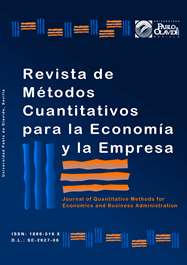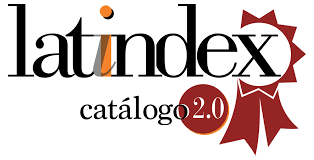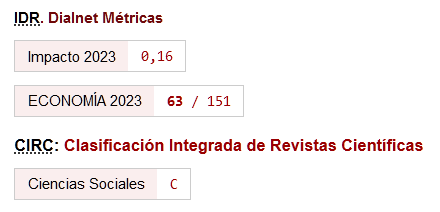Determinantes de la calidad del gobierno corporativo de los bancos hondureños
DOI:
https://doi.org/10.46661/revmetodoscuanteconempresa.6151Palabras clave:
determinantes del gobierno corporativo, dimensiones de gobierno corporativo, gobierno corporativo, indicadores de gobierno corporativoResumen
El propósito de este estudio es determinar un sistema de indicadores para evaluar la calidad del gobierno corporativo de los bancos hondureños. Para ello, se profundizó en la importancia atribuida por supervisores y supervisados a las dimensiones e indicadores de Gobierno Corporativo (GC) propuestos. Asimismo, se identificaron las diferencias existentes entre ambos grupos para crear un índice de calidad del GC con los indicadores que obtuvieron una media global superior a 3.5 en la escala de Likert de 1-5 y el peso ponderado de las dimensiones. El enfoque de esta investigación es cuantitativo, con alcance correlacional y diseño no experimental, de corte transversal. Se aplicó una encuesta a funcionarios bancarios y supervisores de bancos, cuya escala posee fiabilidad (Alpha de Cronbach 0.961) y las pruebas de normalidad reflejan puntuaciones aceptables (modelo de dos pasos). Los resultados indican que la dimensión de mayor importancia es “relaciones con los accionistas” con un peso ponderado de 20.73%, seguida de “efectividad de la junta directiva” (20.44%), “relaciones con los grupos de interés” (20.42%), “función de auditoría interna…” (20.32%) y “remuneraciones y beneficios (18.09%). Asimismo, el 14% de los 70 indicadores obtuvieron puntuaciones globales medias superiores a 3.5, los cuales pueden eliminarse o analizarse en mayor profundidad con un panel de expertos. También, la prueba t de Student reveló diferencias significativas en el criterio de supervisados y supervisores en cuatro de cinco dimensiones de GC, aceptándose la hipótesis del investigador, lo que puede estar relacionado con el rol de los encuestados.
Descargas
Citas
Acosta, G. (2018). Gobierno corporativo y poder desde la perspectiva de la teoría de agencia. Ciencias Administrativas, 11, 41-54. http://bit.ly/3sqaRos
Agüero, J. (2009). Gobierno corporativo: Una aproximación al estado del debate. Revista Científica Visión de Futuro, 11(1), 1-24. https://bit.ly/3pKPAUU
Banco Central de Honduras [BCH] (2019). Honduras en Cifras. *https://bit.ly/3pXUZIs
Banco de Pagos Internacionales (2015). Principios de Gobierno Corporativo para Bancos. https://www.bis.org/bcbs/publ/d328_es.pdf
Bank for International Settlements, Basel Committee on Banking Supervision (1988, 2004, 2017). International Convergence of Capital Measurements and Capital Standards. https://www.bis.org/publ/bcbs04a.pdf
Bolsa de Valores de Lima [BVL] (2020). Índice de buen gobierno corporativo. https://www.bvl.com.pe/ipgc/IBGC_nuevo_formato.pdf
Canto de Gante, A., Sosa, W., Bautista, J., Castillo, J., & Santillán, A (2020). Escala de Likert: Una alternativa para elaborar e interpretar un instrumento de percepción social. Revista de la Alta Tecnología y Sociedad, 38(12), 38-45. https://bit.ly/30DQUSp
Cañadas, I., & Sánchez, A. (1998). Categorías de Respuesta en Escalas Tipo Likert. Psicothema, 10(3), 623-631. http://www.psicothema.com/pdf/191.pdf
Carvalhal da Silva, A., & Pereira, R. (2005). Corporate governance index, firm valuation and performance in Brazil. Revista Brasileira de Finanças, 3(1), 1-18. https://www.redalyc.org/articulo.oa?id=3058/30582471400
Cerdas, D., & Montero, E. (2017). Uso del modelo de Rasch para la construcción de tablas de especificaciones: Propuesta metodológica aplicada a una prueba de selección universitaria. Actualidades Investigativas en Educación, 17(1), 79-95. https://dx.doi.org/10.15517/aie.v17i1.27299
Clark-Carter, D. (2002). Investigación cuantitativa en psicología. México, D.F.: Oxford University Press.
Comisión Nacional de Bancos y Seguros [CNBS] (2016). Resolución CNBS GE No.545/13-07-2016, Reglamento de Gobierno Corporativo. https://www.cnbs.gob.hn/blog/circulares/circular-cnbs-no-0302016/
Comisión Nacional de Bancos y Seguros [CNBS] (2020). Estadísticas. https://www.cnbs.gob.hn/estadisticas/
Creswell, J. (2009). Research design. Qualitative, quantitative, and mixed method approaches. Third Edition. Thousand Oaks, California, United States of America: Sage Publications, Inc.
Dailey, R. (2012). Comportamiento Organizacional. Reino Unido: Escuela de Negocios de Edimburgo. http://bit.ly/3sjt0V2
De la Torre, C. (2017). Responsabilidad social corporativa y auditoría interna. Revista Institucional de Investigación Metanoia: Ciencia, Tecnología, Innovación, 3(3), 113-126. https://bit.ly/3uudUxJ
Dedu, V., & Chitan, G. (2013). The influence of internal corporate governance on bank performance. An empirical analysis for Romania. Procedia-Social and Behavioral Sciences, 99, 1114-1123. Recuperado de http://bit.ly/3dEISNR
Di Miceli da Silveira, A., Pereira, R., Carvalhal, A., & Barros, L. (2007). Evolution and determinants of firm-level corporate governance quality in Brazil. http://dx.doi.org/10.2139/ssrn.995764
Donaldson, L., & Davis, J. (1991). Stewardship theory or agency theory. Australian Journal of Management, 16(1), 49-64. https://bit.ly/37CxEph
Florackis, C., & Palotás, K. (2010). Corporate governance and performance. Advances in Quantitative Analysis of Finance and Accounting, 10, 1-38. https://ssrn.com/abstract=1712068
Freeman, R. (1984). Strategic management. A stakeholder approach. New York, United States of America: Cambridge University Press 2010. https://bit.ly/3w8maVj
Gompers, P., Ishii, J., & Metrick, A. (2003). Corporate governance and equity prices. Quarterly Journal of Economics, 118(1), 107-155. http://bit.ly/3pMuHIT
Hart, O. (1995). Corporate governance: Some theory and implications. The Economic Journal, 105(430), 678-689. https://doi.org/10.2307/2235027
Heras, A., & Teira, D. (2015). ¿Cómo mide el riesgo el observador imparcial? Crítica: Revista Hispanoamericana de Filosofía, 47(139), 47-65. http://bit.ly/3qTpr7G
Hernández, R., Fernández, C., & Baptista, P. (2014). Metodología de la investigación. México, D.F.: McGraw-Hill Interamericana Editores, S.A. de C.V.
Instituto Iberoamericano de Mercados de Valores (2015). El Gobierno Corporativo en Iberoamérica. Madrid, España: Fundación Instituto Iberoamericano de Mercados de Valores (IIMV).https://bit.ly/3pOLmve
Klein, L., & Pereira, A. (2016). The survival of interorganizational networks: A proposal based on resource dependence theory. Revista de Administração Mackenzie, 17(4), 153-175. https://dx.doi.org/10.1590/1678-69712016/administracao.v17n4p153-175
Lefort, F. (2003). Gobierno corporativo: ¿Qué es? y ¿Cómo andamos por casa? Cuadernos de economía, 40(120), 207-237. http://bit.ly/3pJC4kd
Lizcano, J. (2006). Buen gobierno y responsabilidad social corporativa. Partida Doble, 182, 20-35. http://aeca.es/old/comisiones/rsc/partidadoble_buen_gobierno.pdf?idArt=370
López-Quesada, E., & Camacho-Miñano, M. (2011). Impacto de los Indicadores del Gobierno Corporativo en los Resultados Empresariales. Madrid: Universidad Complutense de Madrid. https://bit.ly/3bNIdXZ
Marín, J. (1975). La teoría del contrato social rediviva. Teorema: Revista Internacional de Filosofía, 5(1), 109-116. http://www.jstor.org/stable/43045853
Martínez, F. (2010). Los indicadores como herramientas para la evaluación de la calidad de los sistemas educativos. Sinéctica, (35), 1-17. https://bit.ly/3xbC563
Mazurek, J., Pérez, C., Fernández, C., Magnot, J., & Magnot, T. (2021). The 5-Item Likert Scale and Percentage Scale Correspondence with Implications for the Use of Models with (Fuzzy) Linguistic Variables. Revista de Métodos Cuantitativos para la Economía y la Empresa, 31, 3-16. https://doi.org/10.46661/revmetodoscuanteconempresa.4010
Miller, G. (2005). The political evolution of Principal-Agent models. Annual Review of Political Science, 8(1), 203-225. https://bit.ly/37Ht0X0
Montoya, J. (2016). El Desarrollo Financiero y el Crecimiento Económico. REICE: Revista Electrónica de Investigación en Ciencias Económicas, 4(7), 325-349. https://doi.org/10.5377/reice.v4i7.2837
Morejón, M. (2018). Comportamiento organizacional: Análisis a partir de su aplicación en la administración pública. Revista Enfoques, 16(29), 1-16. https://search.proquest.com/docview/2262083091?accountid=35325
Muth, M., & Donaldson, L. (1998). Stewardship theory and board structure: A contingency approach. Corporate governance, 6(1), 5-28. https://bit.ly/3pRhdLU
Oliva, I., & Alarcón, K. (2018). El efecto del gobierno corporativo y la propiedad sobre el grado de orientación al mercado: Evidencia empírica caso Chile. Universidad y Empresa, 20(35), 79-115. http://bit.ly/3dGQQ99
Organización de las Naciones Unidas (2010). Principios para el empoderamiento de las mujeres. La igualdad es un buen negocio. Oficina del Pacto Mundial de la ONU. https://www.pactomundial.org/wp-content/uploads/2017/03/Women-s-Empowerment-Principles_2011_es-pdf.pdf
Organización para la Cooperación y el Desarrollo Económico [OCDE] (2016). Principios de Gobierno Corporativo de la OCDE y del G20. Paris: Editions OCDE. http://dx.doi.org/10.1787/9789264259171-es
Pérez, J., Chavarría, C., & Morán-Álvarez, J. (2021). Determinantes del potencial de desarrollo económico de los municipios de Sevilla 2007-2012. Revista de Métodos Cuantitativos para la Economía y la Empresa, 31, 104-127. https://bit.ly/3HD8WW2
Pinzón, J., Rosero, O., & Zapata, C. (2018). Relación entre gobierno corporativo y desempeño financiero. Revista de la Facultad de Ciencias Económicas: Investigación y Reflexión, XXVI(2), 85-97. https://bit.ly/3aLZMIh
Raelin, J.D., & Bondy, K. (2013). Putting the good back in good corporate governance: The presence and problems of double-layered agency theory. Corporate Governance (Oxford), 21(5), 420-435.
Redondo, A., & Bilbao, P. (2018). The substance of good corporate governance: an interpretative analysis of corporate governance quality and its metrics. Rivista Internazionale di Scienze Sociali, 3, 283-306.
Ríos, A., Cortés, A., Suárez, M., & Fuentes, L. (2014). Accountability: aproximación conceptual desde la filosofía política y la ciencia política. Colombia Internacional, 82, 261-288. https://bit.ly/3pON6og
Sato, A. (2018). Análisis comparativo de los índices de gobierno corporativo y decisión sobre su aplicación para medir la calidad de la gobernanza corporativa. Madrid: Universidad Pontificia Comillas (ICADE).
Shleifer, A., & Vishny, R. (1995). A survey of corporate governance. Journal of Finance, 52(3), 737-783. https://www.nber.org/papers/w5554
Spence, M., & Zeckhauser, R. (1971). Insurance, information, and individual action. The American Economic Review, 61(2), 380-387. www.jstor.org/stable/1817017
Stubbs, E. (2004). Indicadores de desempeño: naturaleza, utilidad y construcción. Ciência da Informação [online], 33(1), 149-154. https://doi.org/10.1590/S0100-19652004000100018
Suchman, M. (1995). Managing legitimacy: Strategic and institutional approaches. The Academy of Management Review, 20(3), 571-610. http://www.jstor.org/stable/258788
Templeton, G.F. (2011). A Two-Step Approach for Transforming Continuous Variables to Normal: Implications and Recommendations for IS Research. Communications of the Association for Information Systems, 28, 41-58. https://doi.org/10.17705/1CAIS.02804
The Institute of Directors [IOD] (2017). The 2017 Good Governance Report. The great governance debate continued. London: Cass Business School. https://bit.ly/3CBHzdx
Villegas, M. (2006). La teoría de los stakeholders y la emisión de información para todos los interesados. Contaduría, Universidad de Antioquia, 49, 95-102. http://bit.ly/2ZJwF29
Wan, W., & Adamu, I. (2012). Insight of corporate governance theories. Journal of Business and Management, 1(1), 52-63. http://bit.ly/2Mkdau3
Publicado
Cómo citar
Número
Sección
Licencia

Esta obra está bajo una licencia internacional Creative Commons Atribución-CompartirIgual 4.0.
El envío de un manuscrito a la Revista supone que el trabajo no ha sido publicado anteriormente (excepto en la forma de un abstract o como parte de una tesis), que no está bajo consideración para su publicación en ninguna otra revista o editorial y que, en caso de aceptación, los autores están conforme con la transferencia automática del copyright a la Revista para su publicación y difusión. Los autores retendrán los derechos de autor para usar y compartir su artículo con un uso personal, institucional o con fines docentes; igualmente retiene los derechos de patente, de marca registrada (en caso de que sean aplicables) o derechos morales de autor (incluyendo los datos de investigación).
Los artículos publicados en la Revista están sujetos a la licencia Creative Commons CC-BY-SA de tipo Reconocimiento-CompartirIgual. Se permite el uso comercial de la obra, reconociendo su autoría, y de las posibles obras derivadas, la distribución de las cuales se debe hacer con una licencia igual a la que regula la obra original.
Hasta el volumen 21 se ha estado empleando la versión de licencia CC-BY-SA 3.0 ES y se ha comenzado a usar la versión CC-BY-SA 4.0 desde el volumen 22.











